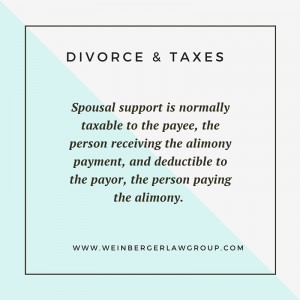Filing Tax Returns after Divorce, Part 2
 In a recent post we looked at some aspects of income tax filing for newly separated or divorced individuals, including filing status and treatment of dependent exemptions. Today, we will look at some of the tax implications of child support or spousal support payments. This information may be helpful not only to those currently working on 2015 tax returns, but also to those in the process of negotiating marital settlement agreements that include support provisions. Divorcing spouses sometimes overlook tax implications that can have a significant impact on each spouse’s post-divorce financial condition.
In a recent post we looked at some aspects of income tax filing for newly separated or divorced individuals, including filing status and treatment of dependent exemptions. Today, we will look at some of the tax implications of child support or spousal support payments. This information may be helpful not only to those currently working on 2015 tax returns, but also to those in the process of negotiating marital settlement agreements that include support provisions. Divorcing spouses sometimes overlook tax implications that can have a significant impact on each spouse’s post-divorce financial condition.
Tax Implications of Child Support Payments
Child support is not included in taxable income for the receiving parent, nor is it deductible from the income of the paying parent. Child support can, however, impact certain other tax scenarios. For example, it can count against a parent’s eligibility for the Earned Income Credit. It can also be a reason why a noncustodial parent might benefit more from the tax exemption for a child than a custodial parent. Even if both parents have similar amounts of disposable income, the tax-free aspect of child support payments, combined with the availability of head of household status for a custodial parent, often means that the parent paying child support will also end up paying higher taxes. This does not mean that a custodial parent should automatically assign the exemption to the noncustodial parent; it is simply one thing to consider in the context of an overall financial settlement plan.
Alimony or Spousal Support
Unlike child support payments, spousal support payments are taxable for the recipient and deductible for the payer. The effects of alimony and child support must always be considered together. Under the New Jersey Child Support formula, alimony is deducted from the payer’s income and added to the recipient’s income before child support is calculated. Generally speaking, paying a higher amount of alimony will lower both child support payments and income tax liability.
Parties in the process of divorce need to keep in mind certain IRS guidelines regarding characterization of payments as alimony as opposed to child support or property distribution. Alimony payments must be specifically designated as such in a marital settlement agreement, separation agreement, or court order. The IRS will treat payments under such orders or agreements as alimony if they are made to a spouse, or to a third party on behalf of a spouse, as long as the spouses do not file a joint return together and all the following apply:
- Payments are in cash (as opposed to property);
- the order or agreement does not state that payments are not alimony;
- spouses who are legally separated under a decree of divorce or separate maintenance are not members of the same household at the time the payment is made;
- liability for payments ceases with the death of the recipient spouse; and
- the payments are not treated as child support.
The IRS rules also provide that alimony does not include:
- child support;
- noncash property distributions;
- payments that are a spouse’s part of community income;
- payments made to maintain the payer’s own property; or
- the cash value of using the payer’s property.
Community income issues are rare in a New Jersey divorce, as New Jersey is not a community property state. Payments relating to maintenance or use of a home, however, are fairly common. Separated spouses sometimes agree that one spouse will live rent-free in a home owned entirely by the other spouse, while the homeowner spouse continues to be responsible for the mortgage, taxes, insurance, repairs, and utilities for the home. In this scenario, the homeowner could deduct only the utility payments as alimony. The homeowner can claim an itemized deduction for mortgage interest and real estate taxes while living in the home, and after moving out can generally continue deducting these items, along with the maintenance expenses and insurance premiums, as business expenses associating with renting the property. Allowing the homeowner to also deduct such expenses as alimony payments would amount to a duplication. If, on the other hand, one spouse is paying expenses on a home owned and lived in by the other spouse, the paying spouse could deduct all of the payments as alimony. If the home is jointly owned, half the payments could be designated and treated as alimony, and each spouse could also deduct half of the deductible mortgage interest and real estate taxes.
Another potential pitfall to be aware of is that there are certain scenarios under which the IRS may treat alimony as child support. This can happen when a payment reduction occurs in close proximity to a contingency relating to a child, such as the child becoming employed, leaving home, finishing school, getting married, or attaining a certain specified age or level of income. In this type of scenario, the IRS will presume that the payments are more properly characterized as child support than as alimony. A taxpayer can overcome this presumption by demonstrating that the reductions were determined independently from the contingent events, or that the timing of the reductions is customary in the taxpayer’s local area. Spouses providing for alimony and child support payments in settlement agreements can avoid such issues by consulting with an attorney and by taking care that both of them always report identical amounts for alimony on their tax returns.
You can find more information about alimony and income taxes in IRS Publication 504, Divorced or Separated Individuals. For help with your individual tax situations, consult with an accountant.
To speak with an experienced family law attorney for assistance in crafting tax-friendly alimony or child support provisions in your marital separation or settlement agreement, contact Weinberger Divorce & Family Law Group, LLC for an initial consultation.


